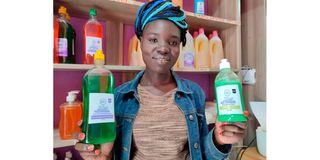‘I had nowhere to go’: How Kibra’s soap is empowering young women

Lilian Mercy displaying some of the Femi Ng’arisha products at Feminist for Peace Rights and Justice Center shop in Olympic area in Kibra, Nairobi County on June 24, 2022.
What you need to know:
- A shop owned by Feminist for Peace Rights and Justice Centre is making it possible for Kibra women to learn how to make soap products.
- They make cleaning products under the brand “Femi Ng’arisha” with Femi standing for feminist.
- Profit earnings from the soap sales goes to meeting the basic needs of the GBV survivors and teen mothers at the temporary shelter.
Outside a shop in Olympic area in Kibra, a slum in Nairobi County, Lilian Mercy is busy mixing raw materials in a large green basin with a huge cooking stick.
The shop belongs to Feminist for Peace Rights and Justice Centre (FPRJC), a women’s rights organisation that made it possible for her to learn how to make the haircare product.
In 2021, the centre in partnership with United Nations Population Fund and Meiji Holdings, trained Ms Mercy alongside 21 other young women on production, branding and marketing of cleaning products.
Today, Ms Mercy is putting her skills to use and at the end of the day, the proceeds will sustain her and her one-year-old son.
Her cohort makes the cleaning products under the brand “Femi Ng’arisha” with Femi standing for feminist. They are then stocked at the shop from where they are sold at prices ranging from Sh100 to Sh2,000.
Their brand band has grown from the original seven products to 11 including shampoo, multi-purpose, hand wash and stain remover.
Rental house
Others are bleach, disinfectant and dish wash soap. They also make fabric softener, sanitiser, anti-bacterial soap and bar soap.
Ms Mercy had in March 2021, been chased away by her mother from their rental house in Kisumu Ndogo in Kibra. At the time, her son was just six months old.
“I had nowhere to go. I’m grateful to Feminist Centre (FPRJC) for taking me with my child and equipping me with these skills,” says the 20-year-old as she mixes the raw materials.
She is currently staying at the Feminist Rescue Centre within Kibra. The centre hosts teenage mothers and survivors of gender-based violence from the vast slum.
During the day, Ms Mercy leaves her child at a day-care where he is looked after at a daily charge of Sh200.
She is able to cover the cost from the proceeds of the cleaning products. For now, her home is the centre and her source of income is the shop where she is charged with producing and making the cleaning products.

Editar Adhiambo Ochieng', the executive director of Feminist for Peace Rights and Justice Centre in Kibra on June 24, 2022. She says buying the soap is synonymous with supporting Kibra's young women.
FPRJC Executive Director Editar Adhiambo Ochieng’, says while the 22 equipped women aged 22 to 30 are main producers and suppliers of the Femi Ng’arisha products sold at the shop, they are also free to produce and sell them separately.
“If you are buying Femi Ngarisha, you are not just buying a soap, you are buying a soap that is empowering women,” she says, adding that they plan to diversify into a cleaning company.
Temporary shelter
On average, the centre earns a monthly profit of Sh6,000, all of which goes into meeting the basic needs of the GBV survivors and teen mothers at the temporary shelter, which hosts four women and girls at any given time.
Since 2020, a minimum of three survivors plead with her, daily, to take them in.
“It pains me that I cannot offer them the immediate rescue they desperately need,” she says.
She, however, refers them to other shelters with a higher accommodation capacity.
She hopes to expand the shelter to her envisioned standards of a safe haven that offers all-round services including psychosocial, medical and legal.
“I appeal for more support. This is a community project and together we can empower our young people to fight gender-based violence,” she says.





